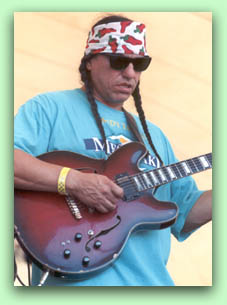
Keith Secola
Interview by Alyce Wilson
Keith Secola and his band, the Wild Band of Indians, blends Native American rhythms and good pure rock.
Secola's vocals have the raw ghostly power of Neil Young. A singer, songwriter, electric and acoustic guitarist and flutist, Secola is an Anishinabe Indian from the Mesabi Iron Range of Northern Minnesota.
He recently consented to an e-mail interview with Wild Violet editor Alyce Wilson.
Alyce: What are your most recent projects? Recording or performing, or elsewhere?
Keith: I've been producing other Native talent and writing songs for my next album, "Native Americana." Been performing all across North America this last year.
Alyce: I was struck by how much your guitar playing reminded me of Neil
Young. Am I right in believing he's an influence on your music? What are
some of your influences?
Keith: All the Bob's. Bob Dylan, Bob Marley, Bob Johnson, Bob Bowie, Bob Lennon, and of couse, Bob Young.
Alyce: The blend of rock music with Native American chanting and drumming
creates a rich texture to your music. How did this blend come about? Was
it something you yourself had always done, or did it come about through
your association with the Wild Band of Indians, including Moontee Sinquah?
Keith: I wrote "Indian Cars" in the early 80's. I worked
with
various Native singers in the last 23 years. The Wild Band of Indians
were part of this sound, but were just starting to get creative with music.
Alyce: Could you talk about your songwriting process? What inspires you,
and how do you move from inspiration to song?
Keith: Some songs you work on some songs come from higher souces in moods of inspiration.
Alyce: I've noticed three significant, interweaving themes running
through your music: political awareness ("Innocent Man"), humor
("Finger Monkey" and "Indian Car"), and the Native
American experience ("Frybread"). What, in your words, are some
of the messages you'd like to get across to your listeners? How do you
typically translate these messages into music?
Keith: Your analysis of my music is very good, I use musically and lyrically methaphors in my songs.
Alyce: What was it like performing at the 2002 Winter Olympics? How
did that gig come about?
Keith: Outside looking in. Corporate wealth vs. tribal poverty. The gig came about because the Olympics (United Artists) needed a native band that can entertain a mainsteam audience.
Alyce: Every chance I get I play people "Indian Car," and
they love it. Is it still getting the sort of airplay it was getting a
few years ago in some regions of the country? Are you seeing wider airplay
of your music, now that you're getting more national exposure?
Keith: The underground hit that never was but always will be. I like the Irony about that, I guess, that is what NDN's Karz is all about, Irony.
Alyce: Now that you're reaching new pinacles and earning new awards,
do you think there's a chance you'll see wider, mainstream appeal? Is
that something you'd welcome? Why or why not?
Keith: When Quinn the Eskimo gets here everybody's gonna jump for joy. Yes, I welcome mainsteam appeal. It is happening more and more, people are coming out for the shows. More success enables me to help our people more, to do God's work.
Alyce: When I first heard you live, you told the audience to go watch
"Smoke Signals," which is an excellent film, by the way. Do
you have any current recommendations? How important do you think it is
for independent artists/musicians in general and Native American artists/musicians
in particular to cross-promote each other's work?
Keith: Because of the Informal Native American Support Group and Network, independent Native artists are able to find Native American rock 'n' roll safe houses across North America and Europe.
Alyce: What's the most frequent question you get from reporters, and
how do you usually answer?
Keith: Q. What makes the Redman, Red?
A. Polywalla dumb
dumb.